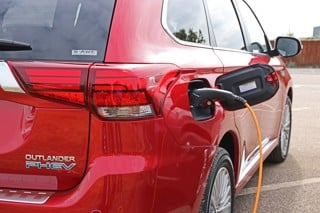Pressure is mounting on the Government to unveil a package of incentives in the Budget if it wants to achieve its ambitious electric vehicle (EV) target.
However, the lead up to the Budget, scheduled for March 11, has been disrupted by the shock resignation of Chancellor of the Exchequer Sajid Javid and his replacement by 39-year-old former chief secretary to the Treasury Rishi Sunak.
Ministers want every new car and van sold by 2035 to be zero emissions, ending the sale of new petrol and diesel vehicles five years earlier than previously announced and including hybrids for the first time.
Grant Shapps, secretary of state for Transport, has since suggested that the date could be brought forward to 2032, subject to consultation.
While broadly welcoming the Government’s ambitious environmental target, the fleet and leasing industry believes it will only be achieved with the right support.
A key enabler, it says, is the plug-in car and van grant, which offers up to £8,000 off the cost of an electric van and up to £3,500 off an electric car.
However, its future remains unclear, with Sunak expected to make an announcement in his first Budget.
The level of funding, and to what vehicles it applies, has been changed since it was launched in 2012.
The plug-in car grant was cut by £1,000 in 2018 and fleets were told it would no longer apply to hybrid cars with a range of less than 70 zero-emission miles.
The Government said the reduction in funding – from £4,500 to £3,500 – for the cleanest cars, and withdrawing the grant completely for the likes of the Mitsubishi Outlander PHEV and the Toyota Prius plug-in, was a sign of success.
Now, the grant could be cut again or ditched, exactly when fleets are calling for it to form part of a package of much-needed measures.
British Vehicle Rental and Leasing Association (BVRLA), whose members own and operate more than five million cars, vans and trucks and buy nearly half of all new vehicles sold each year, is urging fleets to write to their local MP to get support for the “vital grants”. It has set up a campaign page on its website.
BVRLA chief executive Gerry Keaney said: “Fleets are being asked to invest billions of pounds in electric vehicle technology and infrastructure.
“To achieve these goals, the Government must provide a clear support package through to at least 2025. It must preserve the plug-in car and van grants, maintain a strong set of tax incentives and tackle the huge and often arbitrary costs associated with fleet charging infrastructure.”
In 2019, sales of battery electric vehicles (BEVs) saw the highest-level market penetration to date at 37,850 cars, which was 1.6% of the 2.3 million cars sold.
In January, alternative fuel cars (AFVs) continued to grow in popularity. Hybrids increased by 20.6%, at 8,941, and plug-in hybrid electric vehicle (PHEV) demand more than doubled, up 111.1% to 4,788 units.
BEV registrations, meanwhile, surged 203.9% to 4,054 units and a 2.7% market share. Combined, AFV registrations secured a record 11.9% of the market in January, up from 6.8% in the same month last year.
A new zero per cent benefit-in-kind (BIK) tax rate for pure electric company cars is one measure that is expected to be ratified in the Budget.
But, fleet trade body ACFO says the Government must do much more to help fleets begin to make the switch. It is calling for charge points to be interoperable, a long-term commitment to the plug-in grant and a longer-term view of company car tax rates.
ACFO chairman Caroline Sandall said: “More support is also required for fleets with significant commercial vehicle operations to transition to the new technology – both electric and hydrogen – as adoption is barely registering and vehicle manufacturers seem to be struggling to deliver workable solutions to meet real-world operational demands.”
In fact, the Freight Transport Association (FTA) believes that unless the Government takes urgent action to solve the challenges around power supply and the availability of EVs, the 2035 target for vans will fail.





















Login to comment
Comments
No comments have been made yet.